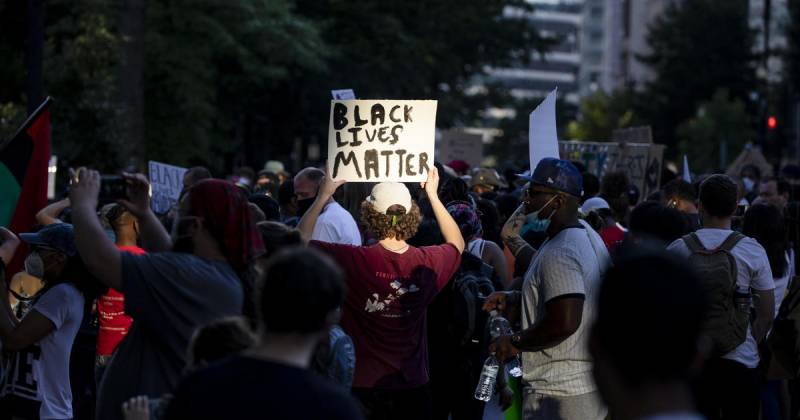
Think: once, a white girl
Was kidnapped and that’s the Trojan War…
Are we not worthy of a city of ash? 1000 ships
Launched because we are missed?
Danez Smith’s lines, written in 2014, reverberate against the backdrop of the ‘poetic rage’ that is happening in the United States as we speak. The Black Lives Matter (BLM) movement has ferociously captured the hearts of people in the US and across the world. In less than a month, it has managed to move millions. According to the New York Times, as of May 28, there were 8 million 'Black Lives Matter' tweets. As the sheer statistic shuns out white noise, let us for a moment return to Danez Smith’s lines that I quoted above.
In a simple way, they ask: don’t our lives (black lives) matter? Are they not loved and owned with an intensity that a white girl was? Smith plays subtly with the state of being ‘missed’ – for Helen was just kidnapped, but being ‘missed’ could also denote being dead. Imagine that for a moment: gone. The black despair of it.
“I can’t breathe” is a slogan that is being used in the BLM movement. Eric Garner repeated the phrase 11 times before he lost consciousness to police brutality in 2014. Ross Gay, in his 2015 poem “A Small Needful Fact” writes how Garner (who was a horticulturist) would put plants into the earth “Making it easier/ For us to breathe.” In some sort of vile twist to the story, Garner chanted on the very thing that he made possible on this earth: breathing and the right to breathe. Flash forward to current times: In Denver, protesting people lay on the ground for 9 minutes chanting “I can’t breathe” to commemorate the suffering of George Floyd at the hands of the police. Rosamond S. King, writes: “You have the/ Right to breathe and remain/.Imagine/That.” (2019)
In the present times, there seems to be an aversion to the very concept of a ‘kindhearted white’ person. Indeed, Terrance Hayes writes:
“Even the most kindhearted white woman
Her head in a chamber of black
Modern American music may begin, almost
Carelessly, to breathe n-words.” (2017)
In the last line is the persistence of the word ‘breathe’ again. All these references to breathing seem to suggest something as close as impulse and as necessary as air. The ‘n-words’ referred to in the stanza, are of course terms that denote the pejorative ‘nigger’, not the empowering ‘negritude.’ The poem suggests that it is second nature for the white woman to look at black people in a derogatory way. BLM then seems to be a movement against the very white racist impulse that has lasted centuries.
Langston Hughes (1902 – 1967), a great advocate of celebrating black life, wrote about dreaming of an America where “…opportunity is real, and life is free/ Equality is in the air we breathe.” Thus, basic human rights should be afforded to each and every human being, regardless of the colour of his/her skin. The air we breathe is quoted here as well, and it is moving to consider that so many of these poems written by black poets have this constant, haunting reference. It is essentially as if they have been denied the right to breathe, i.e., the right to exist.
Another popular slogan in the Black Lives Matter Movement is “no justice, no peace.” Here, it might as well be justice to every breathing life, justice to every breath, justice to every dying breath. There is no end to the riveting slogans one hears about. “Is my son next?” is just one more of them. Danez Smith puts it succinctly in his poem:
“& isn’t that what being black is about?
Not the joy of it, but the feeling
You get when you are looking
At your child, turn your head,
Then, poof, no more child.
That feeling. That’s black.”
In the above poem ‘black’ masterfully turns to black as an identity, and simultaneously the black of a black hole you confront in your consciousness as your child is no more. He also denies feeling any ‘joy’ or celebration, the kind that Langston Hughes spoke about in the Harlem Renaissance of the 20s. Smith here confronts the very dark reality of what it has started to mean, to be black.
Powerful movements, like echoing songs inspire other unheard voices to step out of the flames. There is at the moment a lot of backlash against the slogan, “All Lives Matter,” but for those of us living in Pakistan, I think the backlash is a little out of context. The idea remains that right now all that matters is the atrocity that is being committed against the black people. However, a poetic outlook won’t be able to help but notice that there are endless cases of missing people near us in Baluchistan and Kashmir, and at this time, because of the uproar for the sanctity of life and those that are ‘missed’ we should chant their names under our breath as well, almost without being able to help ourselves.
